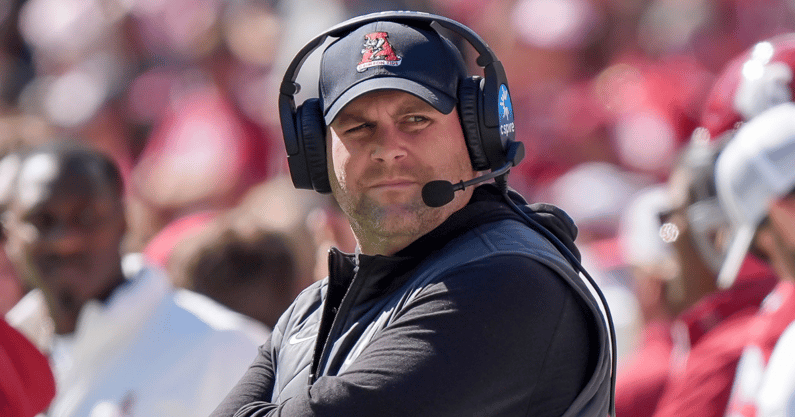How execution affects Alabama's defensive play-calling

TUSCALOOSA, Ala. — The Alabama defense has been under fire as of late.
The Crimson Tide entered halftime against Georgia having just played its best 30 minutes of defensive football of the season. Up 30-7, Alabama was cruising. Since then, it’s been quite the mixed bag.
Alabama allowed 24 points in the second half to Georgia in a near-collapse, and followed it up by allowing 40 to Vanderbilt in the most stunning loss of the college football season so far. The defense looked improved against South Carolina in a 27-25 win last weekend, but still, the defense had its moments of ineptitude.
What Alabama did do against South Carolina was make a few changes regarding its personnel on the field.
Alabama has run a 4-2-5 defensive formation, or nickel, for the vast majority of the season. Throughout the game against the Gamecocks, the defense mixed in a 4-3 front, bringing a defensive back off the field in favor of an extra linebacker.
The Crimson Tide also utilized some different twists and stunts along the defensive line, along with some differing pressure packages coming from the linebackers, or even defensive backs off the edge at times.
During his Monday press conference, Alabama defensive coodinator Kane Wommack was asked about his ability to showcase a wide variety of defensive play-calls, and specifically how much the execution on the field affected the ability to make those calls.
Wommack explained the difficulty in balancing the two.
“That’s ultimately the give-and-take that we’re trying to look at every single week. What can we execute at a high level and do it consistently and yet still have enough wrinkles that we’re not a vanilla defense that the teams feel like, ‘Okay, they’re able to lock in and attack,'” Wommack said. “I think early on we showed a few different things to set some things up as we navigated into SEC play, so now we’ve started to show more of those wrinkles. We were able to show a lot more this past week from the standpoint of some pressures and some little nuances and change-ups that we had not shown before, and we’ll keep throwing some of those wrinkles in as we go. That’s one of the things that are an advantage as a first-year defense, right? There’s always going to be some wrinkles and things that you go and throw in.”
The South Carolina game was the most variety we’ve seen in Alabama’s defensive play calls as of late. In the Vanderbilt game, Alabama was very predictable defensively, allowing the Commodores to move the ball at ease and leaving the Crimson Tide defenders unsure about what their job was.
“I felt like in the game, you want to make sure that you are simple enough, so that our players can go execute as that’s constantly the battle that we’re looking at. ‘Okay, what are we doing on third down and fourth down that we didn’t execute well enough?’ Well, if it’s an execution issue, is it something that we can call differently, we limit some of the things that we’re calling, we get really good at this, or we’re going to manufacture some pressure through something else from a scheme perspective,” Wommack said. “I don’t mean to be too vague, but also don’t want to give away the house there, but I think there’s a fine line there of what we need to be able to do. Ultimately, it doesn’t matter what we call. If we can’t execute it consistently, we’re going to have a problem. Some of that is just the growing pains of a new defense in Year 1, and that we’re going to have to continue to work through.”
One things Wommack strongly believes is that better execution will come with time, as this defense has only played six games in this defensive system. As the season continues and the games go on, Wommack knows that even play-calls that previously failed can be better executed with more experienced under the team’s belt.
Top 10
- 1Trending
8th year Cam Rising?
Utah QB could take medical redshirt for 8th season
- 2Hot
Sankey on Smart shove
SEC commish: Georgia HC should've been flagged
- 3
OU QB update
The Sooners decided on QB1
- 4
Gundy headbutted by cow
Mike Gundy forced to Zoom presser thanks to cow
- 5
Graham Mertz injury
Florida QB expected to miss remainder of season with knee injury
“So you can’t sit there and throw the baby out with the bathwater sort of speak, where all of a sudden now you’re saying, ‘Hey, I’m going to get rid of this call that’s been very beneficial for us over the years, and we’re going to get rid of it because we didn’t execute it well enough in Weeks 2-4′, when in Weeks 6-8 if we’ll just continue to stay in our process, I think those things will come to fruition,” Wommack said.
Against Tennessee specifically, it will be interesting to see what kind of defensive formation and calls Alabama chooses to make. The Volunteers under head coach Josh Heupel have continually had dynamic offenses built around wide spread formations that attack the perimeter of the field.
In Tennessee’s loss to Arkansas two weeks ago, the Razorbacks utilized a lot of dime formation, putting six defensive backs on the field. It was very successful, as Arkansas held Tennessee to just 14 points in the win.
Alabama has yet to run dime this season, typically fielding five, or sometimes four defensive backs on any given defensive snap. Knowing what Arkansas was successful doing, Wommack was asked if Alabama would incorporate anything like that this weekend.
“I think when you look at what this team is, this is a run football team. They are spreading you out with their receiver splits, so that they can establish one on ones in the run game, and that they can basically say, you know, they’re going to separate the pass coverage from the box responsibility and who’s leveraging those play,” Wommack said. “So for us, based off of the different personnel groupings they have, and based off the formations that they’re going to come out in, you know, we’re going to have to be able to defend the lateral space and the vertical space on the outside, but also make sure that we’re leveraging the box.
“Because this is a run football team, they want to establish a run, and then they set that up to take shots downfield. So I think for us, you know, you don’t want to get too far away from home base — who you are and what you do. But from a personnel package standpoint, we’re always going to look at, you know, whatever we think is the optimal scheme and personnel to get get our players in the right position.”

























